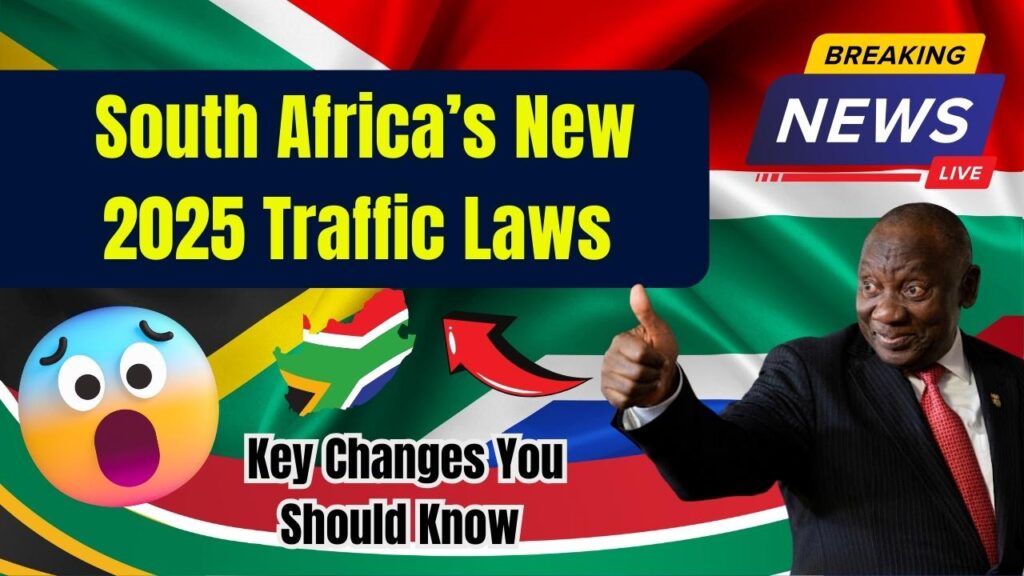South Africa’s New 2025 Traffic Laws – South Africa is set to introduce new traffic laws in 2025, aiming to improve road safety, enforce accountability, and reduce accidents. The updated regulations include the long-anticipated AARTO demerit system, stricter penalties for reckless driving, and enhanced enforcement measures.

Whether you’re a driver, pedestrian, or transport operator, these changes will affect you. Understanding the new traffic rules is essential to stay compliant and avoid unnecessary fines or penalties.
South Africa’s New 2025 Traffic Laws
| Topic | Summary |
|---|---|
| AARTO Demerit System | Drivers accumulate demerit points for violations, leading to suspensions. |
| Stricter Penalties | Higher fines for reckless and drunk driving; fines must be cleared for renewals. |
| New Road Traffic Amendment Bill | Stronger enforcement, regulation of driving schools, and vehicle examiners. |
| License Suspension & Cancellation | Excessive traffic violations may lead to permanent license cancellation. |
| Impact on Drivers & Businesses | Stricter regulations for commercial transport and logistics companies. |
| Pedestrian & Cyclist Protections | New laws ensuring safer crossings and designated cycling lanes. |
| Official Source | South African Department of Transport |
South Africa’s 2025 traffic laws aim to make roads safer and more accountable. With the AARTO demerit system, stricter penalties for offences, tighter regulations for transport businesses, and enhanced pedestrian protections, both individuals and companies must adapt to the new regulations.
What Are the New 2025 Traffic Laws in South Africa?
1. The AARTO Demerit System
The Administrative Adjudication of Road Traffic Offences (AARTO) Act introduces a demerit system that tracks driver behavior. If you commit traffic violations, you will accumulate points on your license. If you exceed a certain limit, your license may be suspended or permanently revoked.
How It Works:
- Each violation adds 1 to 6 demerit points to your record.
- Accumulating 15 points or more leads to a license suspension.
- Three suspensions result in permanent cancellation.
🚗 Example: If you run a red light, you might get 3 points. If you speed excessively, you could get 6 points. These add up over time.
2. Stricter Penalties for Traffic Offences
The government is imposing higher fines and stricter enforcement to curb reckless driving.
- Drunk Driving:
- Current limit: 0.05% Blood Alcohol Content (BAC)
- New Limit: 0.02% BAC (zero tolerance policy under discussion)
- Penalty: Heavier fines or mandatory imprisonment for repeat offenders.
- Speeding Penalties:
- Fines increased for exceeding speed limits in school zones and residential areas.
- Repeat offenders may face license suspension.
- Reckless & Negligent Driving:
- New fines introduced for using mobile phones while driving.
- Stronger penalties for reckless overtaking and road rage incidents.
🛑 Key Takeaway: If you have outstanding traffic fines, you won’t be able to renew your driver’s license or vehicle registration until they are settled.
3. The National Road Traffic Amendment Bill
The National Road Traffic Amendment Bill brings additional measures to ensure road safety:
- License Suspension & Cancellation: Authorities can suspend repeat violators’ licenses faster.
- Regulation of Driving Schools:
- All driving schools must be registered and graded.
- Only certified instructors can train new drivers.
- Vehicle Examiners:
- Regular inspections and audits for vehicle examiners.
- Prevents corruption in roadworthy certificate approvals.
- New Road Safety Technologies:
- CCTV cameras will be installed in high-risk zones for automatic violation detection.
- AI-based monitoring systems for reckless driving and signal jumping.
4. Impact on Commercial & Public Transport
These traffic law changes will also affect businesses in the transport, logistics, and delivery sectors.
- Taxi and e-Hailing Drivers:
- Must comply with stricter safety checks.
- Fines or suspensions for multiple passenger safety violations.
- Trucking & Logistics Companies:
- Fleet owners must monitor drivers for compliance.
- Heavy fines for overloading and road violations.
🚛 Example: A trucking company with multiple drivers caught speeding will face both individual and company-wide penalties.
5. Pedestrian & Cyclist Safety Measures
The new laws introduce protections for pedestrians and cyclists, including:
- Designated cycling lanes in urban areas to promote road safety.
- Pedestrian-friendly crossings with stricter penalties for vehicles failing to stop.
- Fines for obstructing sidewalks and pedestrian pathways.
🚶 Example: A driver who blocks a pedestrian crossing could face a fine of up to R3,000.
South Africa to Increase Social Grants & Wages in 2025 – Check Eligibility & Revised Amount
South Africa Big Wage Hike for 2025 Announced– Check If You Benefit!
South Africa SRD Payment Increase in February 2025 – Check SRD Payments Date Amount & Eligibility
South Africa UBI Grants Coming In February 2025 – Check Payment Amount & Eligibility Criteria
FAQs about South Africa’s New 2025 Traffic Laws – Key Changes You Should Know?
1. When will the new traffic laws take effect?
The AARTO demerit system is expected to be fully implemented by mid-2025 across South Africa.
2. How will I know how many demerit points I have?
Drivers can check their demerit points through the AARTO website or by visiting their nearest licensing department.
3. Can I remove demerit points from my record?
Yes. If you do not commit any further violations for 3 months, 1 demerit point will be removed from your record.
4. What happens if I drive with a suspended license?
Driving with a suspended license could result in hefty fines, jail time, or both.
5. Are there new laws about mobile phone use while driving?
Yes, using a mobile phone without a hands-free device while driving can now result in higher fines and demerit points.







